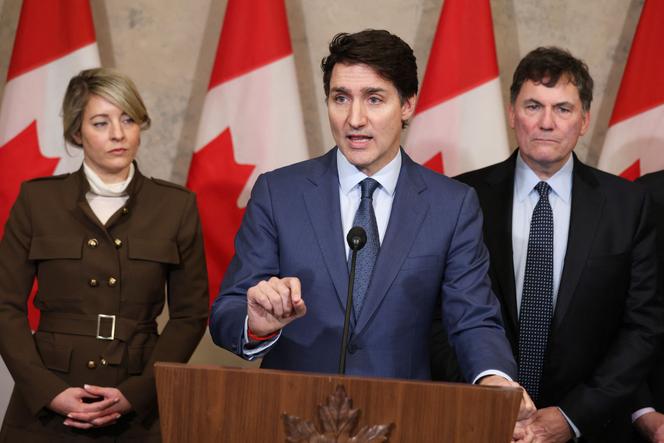


President Donald Trump launched a trade war Tuesday, March 4, against America's three biggest trading partners, drawing immediate retaliation from Mexico, Canada and China and sending financial markets into a tailspin as the US faced the threat of rekindled inflation and paralyzing uncertainty for business. Just after midnight, Trump imposed 25% taxes, or tariffs, on Mexican and Canadian imports, though he limited the levy to 10% on Canadian energy.
Canadian Prime Minister Justin Trudeau said his country would plaster tariffs on more than $100 billion of American goods over the course of 21 days.
"Today the United States launched a trade war against Canada, their closest partner and ally, their closest friend," Trudeau said. "At the same time, they are talking about working positively with Russia, appeasing Vladimir Putin, a lying, murderous dictator. Make that make sense," he added.
Mexican President Claudia Sheinbaum said Mexico will respond to the new taxes with its own retaliatory tariffs. Sheinbaum said she will announce the products Mexico on Sunday. The delay might indicate that Mexico still hopes to de-escalate Trump's trade war.
Trump also doubled the tariff he slapped last month on Chinese products to 20%. Beijing retaliated with tariffs of up to 15% on a wide array of US farm exports. It also expanded the number of US companies subject to export controls and other restrictions by about two dozen.
The president is abandoning the free trade policies the United States pursued for decades after World War II. He argues that open trade cost America millions of factory jobs and that tariffs are the path to national prosperity. He rejects the views of mainstream economists who contend that such protectionism is costly and inefficient.
Import taxes are "a very powerful weapon that politicians haven't used because they were either dishonest, stupid or paid off in some other form," Trump said Monday. "And now we're using them."
Dartmouth College economist Douglas Irwin, author of a 2017 history of US tariff policy, has calculated that Tuesday's hikes will lift America's average tariff from 2.4% to 10.5%, the highest level since the 1940s. "We're in a new era for sure."
US markets dropped sharply Monday after Trump said there was "no room left" for negotiations that could lower the tariffs. Shares were mostly lower Tuesday after they took effect. The Yale University Budget Lab estimates that Trump's tariffs amount to a tax hike of $1.4 trillion to $1.5 trillion over 10 years and would disproportionately hit the poor.
Trump has said tariffs are intended to address drug trafficking and illegal immigration. But he's also said the tariffs will come down only if the US trade deficit narrows. The American president has injected a disorienting volatility into the world economy, leaving it off balance as people wonder what he will do next.
During his first term, Trump imposed tariffs only after lengthy investigations – into the national security implications of relying on foreign steel, for example, said Michael House, co-chair of the international trade practice at the Perkins Coie law firm. But by declaring a national emergency last month involving the flow of immigrants and illicit drugs across US borders, "he can modify these tariffs with a stroke of the pen,' House said. "It's chaotic."
Democratic lawmakers were quick to criticize the tariffs.
"Donald Trump is not a king," Rep. Gregory Meeks, top Democrat on the House Foreign Affairs Committee, said. "Presidents don't get to invent emergencies to justify bad policies. Abusing emergency powers to wage an economic war on our closest allies isn't leadership – it's dangerous."
Even some Republican senators raised alarms. "Maine and Canada's economy are integrated," said Sen. Susan Collins, R-Maine, explaining that much of the state's lobsters and blueberries are processed in Canada and then sent back to the US.
US businesses near the Canadian border scrambled to deal with the impact. Gutherie Lumber in suburban Detroit reached out Tuesday to Canadian suppliers about the cost of 8-foot wood studs. About 15% of the lumber at Gutherie yard in Livonia, Michigan, comes from Canada. Sales manager Mike Mahoney said Canadian suppliers are already raising prices. "They're putting that 25% on studs.'' Builders will strain to stay within their budgets.
After years of effort and thousands of dollars in investment, Tom Bard, a Kentucky craft bourbon distiller, gained a foothold in the Canadian provinces of British Columbia and Alberta and watched his sales grow north of the border. Now Kentucky bourbon is in Canada's crosshairs, and an order from his Canadian distributors is on hold.
"That hurts," he said. At his small distillery "every single pallet that goes out the door makes a huge difference ... The last thing you want is to have an empty spot where your bottles are supposed to be on a shelf."
Bard co-owns the Bard Distillery with his wife, Kim, in western Kentucky's Muhlenberg County, about 135 miles (217 kilometers) southwest of Louisville, Kentucky.
